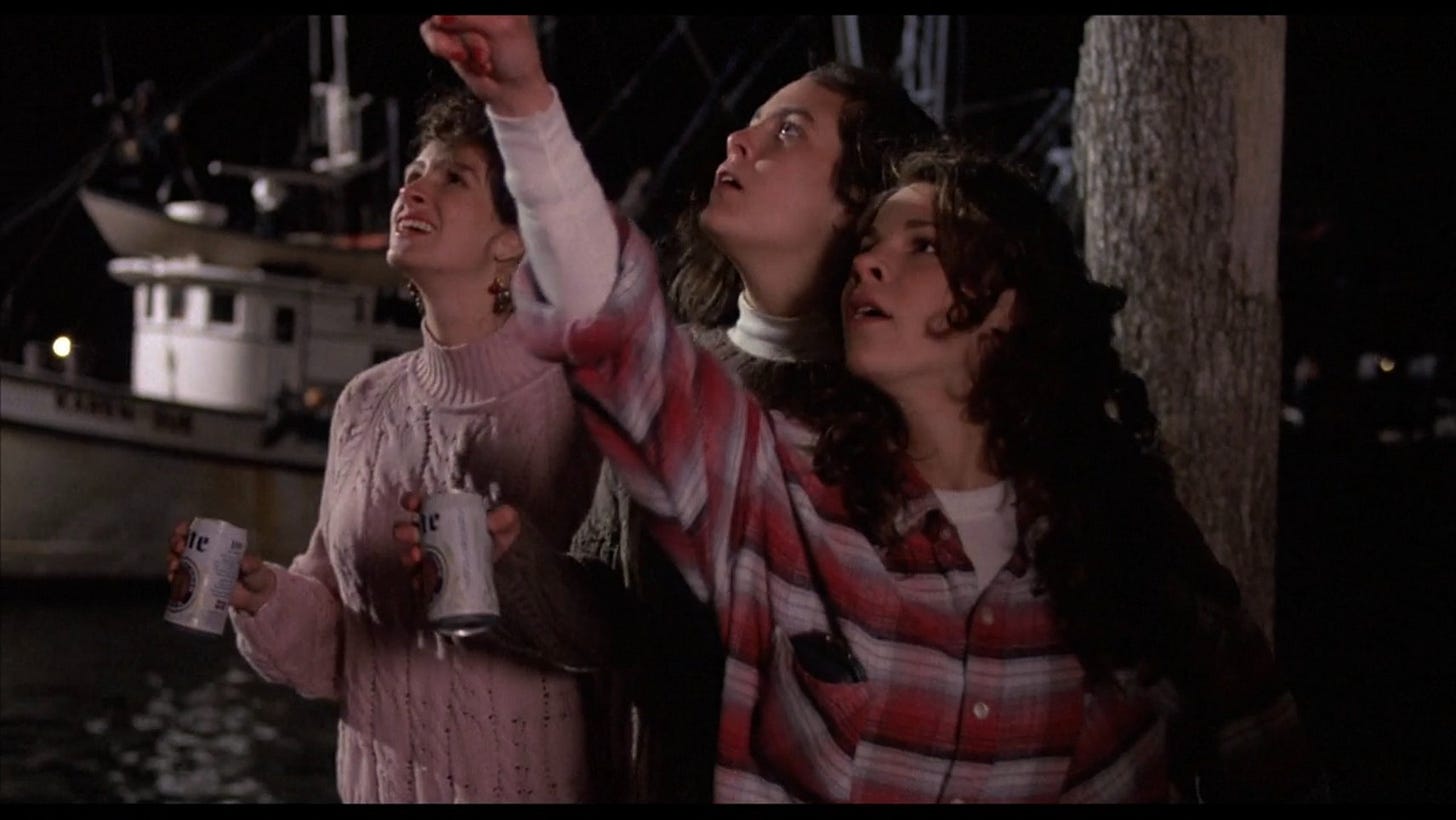In this issue: Blow the Man Down (2019, 91 minutes, free to stream on Amazon Prime and available to rent), Mystic Pizza (1988, 104 minutes, free to stream on HBOMax and Amazon Prime)
I do not think I will be blowing any minds when I say New England is extremely overrepresented in filmmaking. On one side, we have violent thrillers about the primeval nature of man (Stephen King adaptations, Ben Affleck movies), on the other, hyper domestic fantasias about green lawns and country club memberships (The Stepford Wives, Gilmore Girls, the baby shower episode of Sex and the City).
Blow the Man Down (directed by Bridget Savage Cole and Danielle Krudy) was buried in a heap of Covid releases and I am simply begging you to add it to your watchlist. It’s a brief slow burn about two sisters in a quiet coastal town in Maine whose mother has recently passed, leaving them a pile of debt and a small fish shop. When Mary Beth (Morgan Saylor) accidentally murders a dangerous drifter, she seeks help from her buttoned-down older sister, Priscilla (Sophie Lowe). As they struggle to keep the police off their trail, they discover a side of their hometown that has been hidden from them—an underbelly controlled by the town’s matriarchs, played by an all-star cast of character actors: Margo Martindale, June Squibb, Marceline Hugot, and Annette O’Toole.
The relationship of the sisters, the vibrations of this enmeshed coastal small town, the dire threat of poverty and relentless grind of work: it all reminded me of Mystic Pizza (1988). Although different in tone and genre, they’re both capturing something different about New England and the lives of its women, something that’s rarely seen on screen.
People from Connecticut are called “nutmeggers” because the unofficial nickname for CT is “the nutmeg state.” Nutmeg does not grow in Connecticut, which has rocky and inhospitable soil, but was traded in Connecticut during the colonial era. It was also often counterfeited and people were swindled into buying chunks of wood from traveling peddlers. My connection to New England has always felt two-fold. My parents moved to the suburbs from New York City to raise a family, and I am thus more than familiar with its bougie exurb personality. But I also have lineage in Connecticut dating from the Mayflower, with family ties to Benedict Arnold and female axe-murderers. What I’m saying is: the nutmegger side of Connecticut has always felt very much alive.
In 1901, Kate Stephens—a feminist and erstwhile professor who was fired for her “imperiousness and pantheistic views”—published a piece called “The New England Woman” in the Atlantic where she described the New England woman as possessing, “certain characteristics which are weakly human, intensely feminine, and again passing the fabled heroism of saints in self-devotion.” The lifestyle, she wrote, was defined by the intense amount of domestic labor (spinning thread; preserving fruit; making butter, candles, soap) required of these women with little to no paid help and the frequent absence of men called by the sea, the west, or war. The result was twofold: first, New England women were often (incorrectly) perceived as masculine because they control the household with their labor and second, there was an abundance of what Stephens cheekily referred to as “less fortunate women” and “spinners,” i.e., unmarried women.
That archetype, of the hardworking, domestic woman, is a central part of Mystic Pizza and Blow the Man Down. All five of these girls work in food, but not in Nancy Meyers Fisher-Price kitchens with untarnished sets of copper pans dangling above the stove (Kristen Wiig baking a single cupcake in Bridesmaids comes to mind). These are girls who stink of grease and fish guts after work, whose feet ache and blister after a shift. This is skilled, difficult work that is necessary for their survival, and the drudgery of that labor and the acute, persistent absence of wealth is felt painfully by all these women.
Within the three romances of Mystic Pizza is each woman’s relationship to wealth and upward mobility. “The only reason to get married is to get the hell out of Mystic,” Daisy (Julia Roberts) says, and her budding romance with a blueblood law student is proof of that. In marrying Bill (a seaworthy Vincent D’Onofrio), Jojo (Lili Taylor) is reconciling herself to the life her mother had, the dutiful wife of a fisherman, raising a family in the same town where she grew up. And Kat (Annabeth Gish), headed for college, gets a glimpse of what her future might look like as she babysits the only daughter of a yuppie couple, the husband an architect, the wife off working in London.
The three regard each other’s lives with curiosity but not jealousy. It’s worth noting that the first script of Mystic Pizza was written by a woman, Amy Holden Jones, who had hoped to direct it but the studio instead gave it to a man who would go on to exclusively make several extremely bad movies. Jones is probably best known by freaks for directing cult horror movie Slumber Party Massacre (1982) and by latchkey kids for writing Beethoven (1992, the dog one).
I’m deeply curious about the original script, if perhaps it paid more attention to the central relationship of the girls to each other as well as to Leona, who is the owner of the pizza shop and serves as a second mother to the girls. The romances are given a lot of screen time, but they’re not what draws me to the movie. It’s the moments when the three girls are together, talking about their futures, that make this movie special. The acting between the three is beautiful, a showcase for three actresses at the start of humongous careers. And there’s a distinct sharpness in how they relate to each other.
There’s a similar honesty in the relationship between Mary Beth and Priscilla in Blow the Man Down. I’ve written previously about how rarely sisterhood appears in film compared to how many brother duos we have both in front of and behind the camera. I love seeing prickly sister relationships—stuff more complicated than the “we look alike but we’re different!” genre. We see tensions, histories, and tenderness in constant conflict between the two, made all the more pressing not just by the murder but also the real threat of imminent poverty.
I’m not wading into the kind vs. nice of it all, so I’ll let the imperious Kate Stephens describe how these women relate to each other: “Their geniality, like their sunshine, has always had a trace of the northeast wind—chilled by the Labrador current of their theology.” When we see the elders of Mystic Pizza and Blow the Man Down forgive the next generation’s mistakes, it’s neither an endorsement of bad behavior nor emotional repression. It’s them showing grace to someone floundering in their youth, a quiet recognition that privacy is not the opposite of liberation and love can be shown rather than confessed.
Stephens’ piece is more than a taxonomy, it’s a lament of a disappearing prototype: “She is already outnumbered in her own home by women of foreign blood, an ampler physique, a totally different religious conception, a far different conduct, and a less exalted ideal of life.” By foreign blood, she means Catholics and European immigrants—unsurprising from a white feminist in the 1900s. I have no idea if Stephens’ ideal New England woman ever existed, or if it’s just another idle fantasy of a female archetype.
What I do know is that the callus-handed New England woman—the Nutmegger woman—still exists, in both Mystic Pizza and Blow the Man Down. She is informed by and respectful to her matriarchs, what you might call repressed but what I simply call well-tempered, unafraid of work, and able to keep a secret and a legacy. What these girls inherit from their female elders of their town are not just their stories but their methods of survival and a promise of self-determination.
Other people go to Maine. It’s not just pearl-clad housewives and their writer husbands, tormented by literal and metaphorical ghosts. Not every Irish Catholic girl exists to nag their cop/gangster/amateur boxer protagonist boyfriend. There are still some spinners who run their own homes, and I am grateful to see them in the nutmeg side of New England, in all of their glory alongside white-trimmed clapboards and hosed-down docks.









